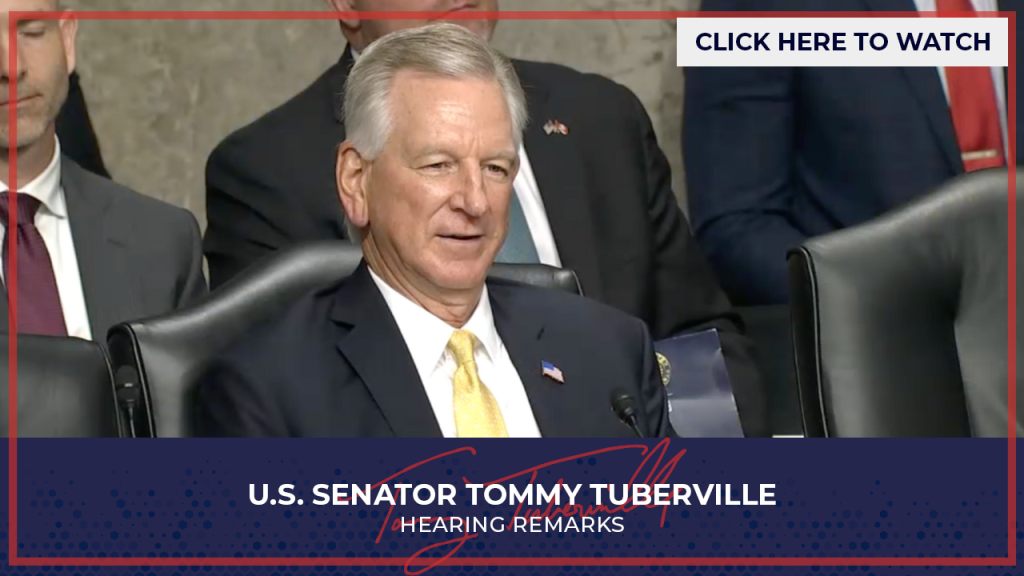WASHINGTON – Today, U.S. Senator Tommy Tuberville (R-AL) participated in a Senate Armed Services Committee hearing to consider the nominations of Vice Admiral Charles B. Cooper II, to be Commander for United States Central Command, and Lieutenant General Alexus G. Grynkewich to be Commander for United States European Command and Supreme Allied Commander of Europe. During the hearing, Senator Tuberville and Lt. General Grynkewich discussed the general’s relationship with NATO commanders as well as the conflict in Eastern Europe. Additionally, he spoke to Vice Admiral Cooper about preventing the Houthis from obstructing trade in the Middle East.
Read Senator Tuberville’s remarks below or on YouTube or Rumble.

ON NATO RELATIONSHIPS:
TUBERVILLE: “Good morning. Thanks for both of your service and moving your families around. Kinda like a coach. You know, you don’t stay very long in one spot. Admiral, it’s good to see your family here. Auburn folks. Good Alabama folks. Living Montgomery, I think.
Right? […]
“General, let me ask you this. What’s your relationship with the NATO commanders in the bigger countries? That we have.”
GRYNKEWICH: “Senator, I have worked with European partners around the world over the years in a variety of coalition environments, and I know many of the leaders across all of those countries. It’s a solid relationship, sir.”
TUBERVILLE: “How about Turkey?”
GRYNKEWICH: “Sir, I’ve had the privilege of visiting Türkiye several times over the course of my career and have great respect for the military capabilities that they can bring to bear.”
TUBERVILLE: “Largest military in NATO. Is that right?”
GRYNKEWICH: “Yes, sir.”
ON LIKELIHOOD OF UKRAINE DEFEATING RUSSIA:
TUBERVILLE: “Yeah. Let me ask this question. This Ukraine-Russia war has been going on for a long time. A lot of people killed. We’ve spent a lot of money. Can Ukraine win?”
GRYNKEWICH: “Senator, I think Ukraine can win. I think anytime your own homeland is threatened, you fight with a tenacity that’s difficult for us to conceive of if we haven’t found ourselves in that same situation.”
TUBERVILLE: “Yeah. They’ve they have absolutely fought hard. You gotta give it to them.”
ON WHO SUPPORTS HOUTHIS:
TUBERVILLE: “Admiral, we hadn’t talked about the Houthis. I think we’ve bombed them for 30 straight days. Is that correct?”
COOPER: “Sir, we bombed them for 51 straight days in conjunction with Operation Rough Rider.”
TUBERVILLE: “Yeah. Have we stopped?”
COOPER: “Sir, the president gave the military a very precise mission, which was to restore the freedom of navigation, and that mission was successfully executed. We have freedom of navigation today. We agreed [to] a ceasefire several weeks ago. Now 40 days ago. If the Houthis didn’t shoot at us, we wouldn’t shoot at them. They have not shot at us. We have not shot at them. And we have multiple examples of destroyers going back and forth through the Bab al-Mandab.”
TUBERVILLE: “Destroyers, but what about merchant ships?”
COOPER: “There is merchant ships flowing through the Bab al-Mandab today. If we walk back to the fall of 2023 when the Houthis started their kinetic actions, it took several months for the flow of commerce to leave the Red Sea. I would expect it’s gonna take several months for it to fully come back.”
TUBERVILLE: “My understanding is that the Houthis are one of the strongest groups that are backed by Iran. Is that correct?”
COOPER: “Sir, they’ve been supported with arms, people, training, ISR for the better part of 10 years. They’re well supported.”
TUBERVILLE: “Yeah. China support’s them too?”
COOPER: “They do.”
TUBERVILLE: “So, do you think this is going to be an on and off project with the Houthis over the years? Or are we going to be able to stabilize it?”
COOPER: “I think we’re now 40 days into this; the ball is in the Houthis’ court. We’re prepared for a range of actions, but I think the policies associated with the ceasefire remain in place, and we’ll just be prepared, from a military perspective, for a wide range of contingencies as is our obligation to do so.”
TUBERVILLE: “Do we actually know who the leadership is that controls the Houthis?”
COOPER: “We do, sir.”
TUBERVILLE: “Yeah. […] Do we talk to them? They talk back to us? How does that work?”
COOPER: “Communications with the Houthis is done through diplomatic channels. And Houthis are a foreign terrorist organization. We don’t have a communication via the military.”
TUBERVILLE: “So the president, when he works and tries to calm the situation down, who does he talk to?”
COOPER: “Sir, he uses the Envoy for the Middle East, Ambassador Steve Witkoff, who helped enable the most recent ceasefire.”
TUBERVILLE: “Yeah. They must be some tough rascals. I mean, we bombed them for 51 days and they’re still kicking. Right?”
COOPER: “They’re extremely well supplied by the Iranians.”
TUBERVILLE: “They’re supplied, but what? Are they dug in?”
COOPER: “As we’ve seen throughout the region, groups are going underground, Hamas, Hezbollah, the Houthis. This is a serious issue that we will have to look at into the future.”
TUBERVILLE: “Yeah. We do make a bomb in Huntsville called ‘MOAB.’ They do a lot of damage. I think we’ve seen that in Afghanistan. We got a few left. So, maybe in the future, [if] we can’t get them to reconcile…because we’re gonna have to have full passage in the Red Sea. If we’re going to get AI going, we’re going to get supply chains going, we can’t haphazardly wonder if they’re going to sink one of our ships but thank you. Good luck to both of you. Thank you very much. Thank you, Mr. Chairman.”
Senator Tommy Tuberville represents Alabama in the United States Senate and is a member of the Senate Armed Services, Agriculture, Veterans’ Affairs, HELP and Aging Committees.
###